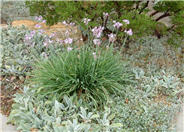
Common name:Society Garlic
Botanical name:Tulbaghia violacea
This clumping perennial will grow 1'-2' tall and has narrow, blue-green leaves. Clusters of lavender flowers bloom in spring and summer. Leaves and flowers have a distinct onion or garlic smell if crushed.

Common name:Spanish Lavender
Botanical name:Lavandula stoechas pedunculata
This dense shrub grows 2'-3' tall with blue-grey foliage and deep purple flowers that have large showy bracts in spring and summer near the top of the spikes. It has low watering needs once it's established. It prefers full sun. Foliage is aromatic.

Common name:Mexican Bush Sage, Mexican Sage
Botanical name:Salvia leucantha
The Mexican Sage is a bushy shrub that grows 3'-4' tall and wide. It has hairy white stems, grey-green leaves and velvet-like purple flower spikes that bloom summer through fall. This shrub tolerates sun, light shade, low to moderate water, and is cold hardy to 15 degrees F. The Mexican Sage attracts hummingbirds. Be careful not to overwater.

Common name:Amazing Red Flax
Botanical name:Phormium 'Amazing Red'
Phormium 'Amazing Red' is an evergreen perennial. This plant has many swordlike, stiffly vertical leaves in a fan pattern, growing 1.5'- 2' tall. Leaves are reddish brown. Flowers are insignificant and bloom infrequently. It does better with occasional watering once it's established.

Common name:Daylily (hybrid selection)
Botanical name:Hemerocallis hybrids
These summer-blooming perennials form clumps with large, grass-like leaves. Its showy flowers, resembling lilies, are borne in clusters on stems held well above the foliage. Daylilies can be found in many colors: yellow, orange, red, purple, pink or multi-colored. Hemerocallis does better in well-draining soil and with extra summer water. Hemerocallis are very hardy,with few or none pests/problems.
| Designer: Susan Stiltz | Parking Strip Color |
Photographer: GardenSoft |
Soils and Compost:
Practice grass-cycling by leaving short grass clippings on lawns after mowing, so that nutrients and organic matter are returned to the soil.
Water Saving Tip:
Replace turf with groundcovers, trees, and shrubs. If you have areas where no one uses the grass, patches that do not grow well, or a turf area too small to water without runoff, consider replacing the turf with water-efficient landscaping.
Integrated Pest Management:
Develop healthy soil for plants that are vigorous and naturally pest-resistant.

